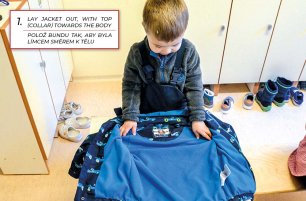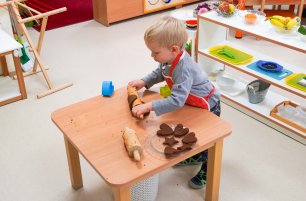Help! How Can I bring Montessori Into my Home?
You may see your child doing all kinds of productive work at school and then it seems that they are a completely different child at home. Does this happen to you? Toys lying all around the house and maybe your child does not want to clean up, or perhaps you are stuck with a sink full of dishes after dinner with no offers to help. There are some simple adjustments and additions that can easily be made in your home which will help you and your family build a happier and more cooperative household.
Rotate the toys
In a Montessori classroom, you will see that there are clearly defined spaces for activity and only a limited number of materials on the shelves. Young children are learning how to orient themselves in their environment and part of this is learning where things go and where to find something when they want or need it. How can we expect a child to clean up if they don’t have a clear understanding of where something belongs? Another factor is that children can often get easily overwhelmed with too many options which is why having large storage bins full of toys may result in your child taking all of the toys out, playing with one or two, then it’s a struggle for you both to get all the toys put back again. Try setting up an area with only 8-10 toys which are organized clearly so your child can see everything available. Hide the other toys away and change them out every 1-2 weeks or as you see fit depending on your child’s needs and interests. Rotating your child’s’ toys will help you to see what interests them, what they are playing with the most, and when it might be time to retire old toys.
Set expectations together
In our classrooms, we value collaboration and working together towards a common goal, so if there is something you would like to improve in your home you can discuss it as a team and come up with guidelines that suit everyone. Children love to be included so sit down together as a family and come up with ideas of how everyone can help and work together. You could even make it a fun activity by writing what is agreed on a piece of paper and having your child decorate it then hanging it up somewhere around the house. One of the guidelines we have in our classrooms is that after you finish working with something, you clean it up. If this is something you agree on as a family, try using gentle reminders like “Remember when we agreed that we would clean up after we finished?” It’s important that you model proper behavior as well so your child sees that the rules apply to everyone. Consistency is key!

Give options for helping
If you would like to see more helping hands around the house, give your child options of how they can help. For example, you can ask “would you like to help with setting the table for dinner or cleaning the plates after we eat?” Avoid yes or no questions and offer specific examples of how they can help. Children are often very eager to help others and they want to feel like valued members of their community. A nice addition to your home could be a “Kitchen Helper” stand - this is a great way to get children involved with cooking and cleaning up.
Implement Practical Life
Practical Life work is a key component in every Montessori classroom, and children absolutely love it! Have items readily available and at your child’s level so they can easily access them when needed. A few examples include a basket with small towels for cleaning up spills, a dustpan with a sweeper, a small mop, and a laundry basket. You can also include practical life activities in your home like feeding the family pet, food preparation, and dishwashing.
by Lindsey Taylor
Want to learn more? Read our next article:




